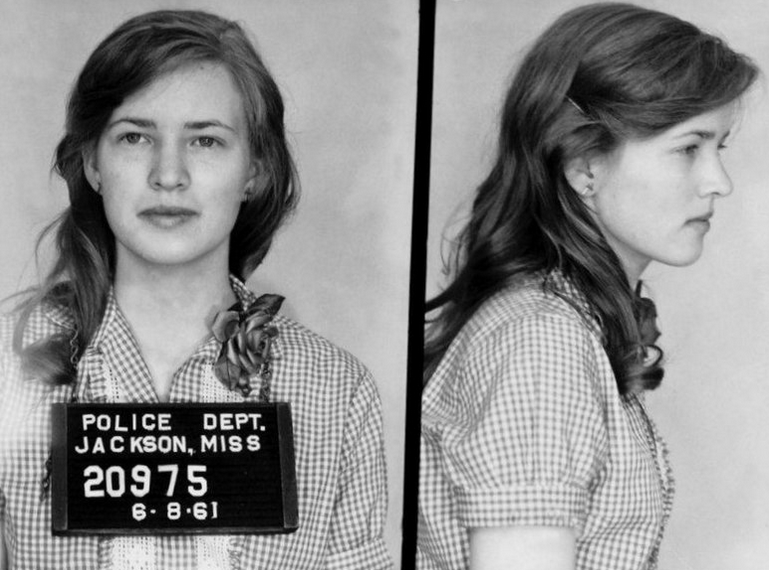By Lynn Burnett
“I am Southern and White – as southern as the red clay of Georgia, as southern as Lee’s mansion overlooking the Potomac.” Such are the roots of Freedom Rider Joan Trumpauer Mulholland, pictured here with American Nazis lurking in the background during the sit-in movement. For her activism, Joan was disowned by her family, attacked, shot at, incarcerated in America’s most notorious prison, and hunted (unsuccessfully) by the Klan for execution.
Joan was 13 when the 1954 Brown v. Board of Education ruling ordered schools to be desegregated. As a young teenager, she experienced the rage that was unleashed throughout the White South as disturbing and ugly: “I knew something was terribly wrong . . We [White] southerners needed to put our OWN house in order.” The feeling grew over time, prompting her to join the sit-in movement as a student at Duke University, in 1960. By the time Joan was 23, she had participated in over 50 sit-ins and demonstrations. Under pressure from Duke University to cease her activism, Joan instead dropped out. She was embraced by Mississippi’s historically Black Tougaloo College, however, and continued there as one of the college’s first White students.
During a sit-in in Mississippi, a White man approached one of the Black sit-in students holding a knife. Joan was participating as an observer, taking notes and watching for safety concerns. Spotting the knife, however, she intervened… and then took a seat at the lunch counter. When the crowd saw a White woman suddenly join the sit-in, they went wild. With screams of “race traitor!”, the demonstration descended into one of the most violent sit-ins of the civil rights movement. Demonstrators were beaten with brass knuckles, burned with cigarettes, and sliced with the glass of broken condiment containers. “We knew we were going to die,” Joan later said. “My spirit had left my body and was hovering somewhere above, protecting me.”
In 1961, when the first freedom riders were firebombed and beaten, Joan volunteered to continue the rides. Her group of freedom riders – which included Stokely Carmichael – were thrown into the notoriously violent Parchman Penitentiary of Mississippi, where Joan was held in the death row unit for two months. Although Parchman was a brutal jail, there was a continuous flow of freedom riders into the cells, and the prisoners filled their days and nights with freedom songs and worship services.
During the build-up to the 1964 Freedom Summer, Joan was placed on the Klan’s death list. The Klan hoped that killing a White civil rights worker would prevent White students from travelling to Mississippi to support the voting rights effort. One night the car Joan and her movement comrades were in was followed, and then blocked by other cars from the front. The driver of Joan’s car was a Pakistani professor named Hamid Kizilbash, and when he was pulled out of the car and beaten, one of the other riders was able to convince the mob that Hamid was a foreigner… and that if a foreigner was killed it would cause international problems (especially during the Cold War) and bring State Department attention to the Klan. The argument worked, and the lynch mob dispersed.
The infamous murders of James Chaney, Andrew Goodman, and Michael Schwerner took place a mere three weeks later, but by that time Freedom Summer was in full swing. Just days earlier, Joan had given Michael Schwerner his orientation… about what he needed to know to survive as a White civil rights worker in Mississippi. She recalls, “Because we weren’t killed, our friends were.”
Additional Resources
Children’s Books
Joan Trumpauer Mulholland: My Stand for Freedom.
Loki Mulholland, Angela Fairwell, & Charlotta Janssen: She Stood for Freedom: The Untold Story of a Civil Rights Hero, Joan Trumpauer Mulholland.
Video & Audio
CBS News: Activist Joan Trumpauer Mulholland recalls sit-in protest decades later.
Civil Rights History Project: Joan Trumpauer Mulholland.
The Joan Trumpauer Mulholland Foundation: Resources.
Podcast by Loki Mulholland: The Uncomfortable Truth.
Video: An Ordinary Hero: The True Story of Joan Trumpauer Mulholland.
Oral history interview: see video and transcript.
Articles
Jasmine Daniel: “They called me ‘race traitor'”: Joan Trumpauer Mulholland’s lifetime of resistance.
Theresa Vargas: ‘The lunch counter now has two empty seats:’ She is the only one left who can describe what it felt like to sit there that hateful day.
Denise Oliver Velez (of the Young Lords and Blac Panther Party): Joan Trumpauer Mulholland: the civil rights activist you may not know about.
Wikipedia entry.
